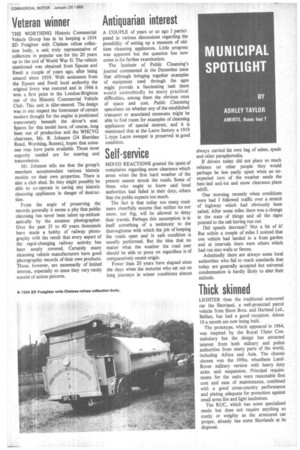Self-service
Page 45

If you've noticed an error in this article please click here to report it so we can fix it.
MIXED REACTIONS greeted the spate of complaints regarding snow clearance which arose when the first hard weather of the present season struck the roads. Some of those who ought to know said local authorities had failed in their duty, others that the public expects too much.
The fact is that today too many roadusers cheerfully assume that neither ice nor snow, nor fog, will be allowed to delay their travels. Perhaps this assumption is in itself something of a testimony to the thoroughness with which the job of keeping the roads open and in safe condition is usually performed. But the idea that no matter what the weather the road user should be able to press on regardless is of comparatively recent origin.
Fewer than 20 years have elapsed since the days when the motorist who set out on long journeys in winter conditions almost always carried his own bag of ashes, spade and other paraphernalia.
If drivers today did not place so much reliance on other people they would perhaps be less easily upset when an unexpected turn of the weather sends the best-laid anti-ice and snow clearance plans adrift.
One morning recently when conditions were bad I followed traffic over a stretch of highway which had obviously been salted. After some miles there was a change in the state of things and all the signs pointed to the salt having run out.
Did speeds decrease? Not a bit of it! But within a couple of miles I noticed that one vehicle had landed in a front garden and at intervals there were others which had run into walls or fences.
Admittedly there are always some local authorities who fail to reach standards that today are generally accepted but universal condemnation is hardly likely to alter their attitude.












































































































